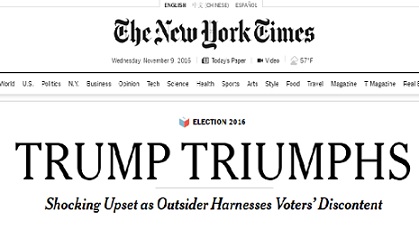Life for the media in the Trump era
 While I was writing my most recent blog post – on the need for journalism of the highest standards in this ‘post-truth’ world – BuzzFeed went ahead and published the full text of the dodgy Trump dossier.
While I was writing my most recent blog post – on the need for journalism of the highest standards in this ‘post-truth’ world – BuzzFeed went ahead and published the full text of the dodgy Trump dossier.
This was in the week before Trump was inaugurated. In an email to our subscribers, we were critical of Buzzfeed’s decision to publish. Despite Jim Edwards’ excellent arguments on Business Insider, we felt that the BuzzFeed approach had failed to fulfil the two critical functions of journalism: to scrutinise the facts, and to guide their readers through them.
The fear was that publishing unchecked allegations would make it easier for Trump to dismiss the entire document, and to attack the media as a whole.
“Trump is an anti-media President elect – and will be an anti-media President,” we wrote. “He has spoken out on the campaign trail against ‘corporate media’. The media should not live in fear of that – but nor should it hand him and his supporters unnecessary ammunition.”
In his first full day as President, Trump’s camp confirmed that they would have no truck with ‘corporate media’. After the media questioned his claims about the numbers of people who attended his inauguration, their operation went into overdrive. His press secretary, Sean Spicer, led a disgraceful press conference in which he harangued the press corps for five minutes, then left the stage without answering questions. An aide, Kellyanne Conway, told NBC that they had ‘alternative facts’ about the numbers – a phrase that should come back to haunt the Trump administration.
Most Orwellian of all, though, was Trump’s speech to the CIA, an organisation he had previously described as hopelessly incompetent. Trump, a confessed serial braggart, addressing the home of US black ops, felt free to describe journalists as ‘among the most dishonest human beings on earth‘.
Nobody blinked. The CIA cheered.
The media is not entirely blameless in this. As we have covered before, in election after election and in recent referendums, they have failed to present the arguments of both sides, and to properly scrutinise them. Media on both sides of the arguments have dropped their standards to suit their cause, and this serves no-one well. It means people never hear proper debates, only an increasing volume of their own arguments. The reductio ad absurdum is a Donald Trump presidency.
Over the next four years in the US and the UK, the media needs to buck up its ideas. Which means going back to basics. Ask the awkward question, print the inconvenient answer – even if it doesn’t reflect the views you are trying to promote.
In Jonathan Freedland’s excellent column yesterday (‘Sean Spicer is a Groucho Marxist‘), he concluded that the best response of the media is not to descend to Trump’s level, but to do its job well. He cited CNN’s coverage of Spicer’s statement as being an excellent template: forensic, dispassionate, and calm.
A lesson for all media in the Trump era.